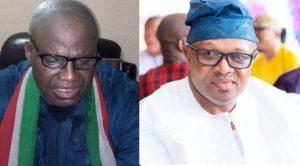The incident that shot up Sunday Igboho to the vanguard of Yoruba self-determination struggle occurred in Igangan, a neighbouring country side town to the north of metropolitan Igboho. On account of this location, the general Oke Ogun community was prone to the incursion and invasion of the Fulani herdsmen terror of recent memory. One of the unacceptable dimensions of the crisis was the degradation regularly meted to the Yoruba victims embodied in the rampant campaign of sexual molestation and rape. This was the immediate spur to the emergence of the Sunday Igboho guerrilla insurgency.
Members of a Fulani militia had charged into the palace of the Igangan monarch (who happens to be an uncle to Sunday Igboho) and requested the company of the olori (the king’s spouse) and daughter for a one week sexual rendezvous. There is a Yoruba proverb that says “Iku ya ju esin”- to die in honour is preferred to total degradation and humiliation. For Igboho, that was the last straw that broke the camel’s back. He launched his counter terror campaign the following day. Since the Igangan incident was more or less a Yoruba wide phenomenon, Igboho had his task cut out for him. Monarchs were no exception to the dehumanisation. At least, five are on record as victims of abduction. Not to talk of the repeated violation and kidnap of Chief Olu Falae.
The report and its import might have eluded many but a day prior to the terrorist massacre of congregationalists during a church service at Owo, the Miyetti Allah association audaciously gave a heads up. In a coded message directed at the Governor of Ondo state, Rotimi Akeredolu, the chairman of the group, Bello Bodejo, “addressed a mammoth crowd of Fulani pastoralists from across Nigeria and beyond and rained curses on some state governors whom, he claimed, chased Fulani pastoralists away from their states using state systems, assuring them that peace will continue to elude them until they reverse their decisions and wholeheartedly welcome and accept the pastoralists as members of the society. We know our friends and enemies and we will act at the right time,”
The siege on the South-West was begging for a leader capable of dominating the streets and Igboho rose to fill the vacuum. The campaign inevitably lit a fire of excitement and caught popular imagination across Yoruba land. Challenged by the gathering momentum and the prospects of the replication of Nnamdi Kanu’s IPOB, in Yorubaland, President Muhammadu Buhari directed a clandestine raid on the Ibadan residence of Igboho. The intervention ended in ambiguity. In the objective to abduct Igboho, the raid failed but it succeeded in halting the roller coaster momentum of the struggle towards the realisation of a putative Oduduwa republic.
Were Igboho to be captured, it would have amounted to the climax of a security sting operation that had earlier resulted in the abduction of the Biafra champion Nnamdi Kanu in Kenya. The proclivity of seeking recourse to the extra judicial abduction of high profile politicians has been an abiding trademark of Major General Muhammadu Buhari. Those familiar with the history of military dictatorship in Nigeria would recall the precedent of the foiled kidnap attempt on Umaru Dikko by the Buhari/Idiagbon military regime.
Benin republic is home to a substantial Yoruba population, who found themselves cut adrift from the parent Yoruba community in Nigeria by the arbitrary fiat of the 1886 Berlin conference. On account of this Yoruba consanguinity and proximity, Benin had become a sanctuary and staging post for the internationalisation of Yoruba political struggles. It was, once again, called upon to fulfil the same obligation to the fleeing Yoruba freedom fighter.
The Benin republic is intertwined with Nigeria to the extent that Beninous president, Matthieu Kerekou actually sought the annexation of Benin by Nigeria during the Obasanjo military rule. For that matter, the second language in the francophone country is Yoruba. This filial relationship was not strong enough to preclude the arrest of Igboho but it was sufficiently sturdy to rebuff the extradition to Nigeria request of Buhari.
At his release, three weeks ago, Igboho issued a statement in which he singled out a number of political grandees who proved crucial to his sustenance while in detention and ultimately facilitated his release and freedom for special tribute.

“I give special thanks to President Talon of Benin Republic and all members of his cabinet. My gratitude goes to my heroic father, Professor Banji Akintoye, and Professor Wole Soyinka for their support in the course of the struggle. You promised to stand by me through my ordeal in Benin Republic and you have fulfilled your promise.“I will not forget to appreciate former President Olusegun Obasanjo, and Baba Ayo Adebanjo for their roles, even though only God gives freedom”. As iterated, those who made the list include Professors Banji Akintoye and Wole Soyinka; President Olusegun Obasanjo and Pa Ayo Adebanjo.
If these eminent Yoruba personalities had chosen to identify with Igboho then there is indeed a question mark on the future of Nigeria. Obasanjo, in particular, is a curious presence. If there is any Nigerian leader alive who personifies pan Nigerian nationalism, Obasanjo it is. If he now numbers high on the hierarchy of those who rally round Igboho in his hour of need, then Nigeria must have gotten geometrically intolerable. In the interim, a lot of water has passed under the Nigerian political bridge, mainly in the form of the election of Asiwaju Bola Ahmed Tinubu as the president of Nigeria.
If Igboho excites curiosity on account of the Yoruba bulwarks who rallied round him, his release is equally noteworthy on account of the absence of a political figure who did not identify with him namely President Bola Ahmed Tinubu. Nonetheless, the Tinubu incumbency must have constituted positive pressure for his release and freedom. It is safe to assume that the Beninous authorities must have second guessed a no-objection stance of the Tinubu administration.
The President’s strategy of distancing himself from Yoruba self-determination movement paid off in the regional support of his presidential aspiration by those ideologically opposed to any meaningful review of the constitutional status quo.
More so, when it is remembered that Tinubu was hitherto at the vanguard of the purveyors of the restructuring of Nigeria. In a political signal to the effect that he was beating a calculated retreat from any tendency that was antagonistic to the political status quo, he disavowed the attribution of the degenerate security situation in the South West to the Fulani herdsmen violation of Yoruba land. To emphasise this position and in demonstration of a penchant for miscue, he chose the occasion of a condolence visit to Chief Rueben Fasoranti at Akure to question the notion that Fasoranti’s daughter (Funke) was murdered by Fulani wayfarers. He reasoned that the absence of cows at the vicinity of the murder is exculpatory of the Fulani suspects (as encapsulated in his infamous taunt, “where are the cows?”).
The political evolution of Nigeria is at another critical juncture and requires a situation report on the prospects of the make or mar decentralisation and devolution of powers. The struggle for constitutional reforms and restoration of federalism in Nigeria has remained immobilised by the depredations of power politics. It is always going to be tough to get the voluntary buy-in of personal (elected presidents) and ethno regional beneficiaries of the extant quasi-unitary state into a federalism restoration agenda. Ironically, federalism themed resistance to the political status quo has been dampened by the exit of Buhari and the entry of Tinubu as President. The Buhari presidency was a veritable indication of all that was constitutionally and politically wrong with Nigeria. He constructed his presidency as a conspicuous and provocative bulwark against federalism-allied equity, fairness and justice and redefined federalism as the irreducible minimum constitutional reform.
Buhari trenchantly and persistently clarified that the over-centralisation of power at Abuja was a sure bet to unravel Nigeria, sooner than later.
He was more divisive and parochial than all his precedents put together and exemplified the nativist politics of institutionalised discrimination, of we versus them. He even contemplated the departure gift of ensuring the emergence of another Northern Muslim as his successor. Mercifully, he was thwarted by the APC governors from the North albeit for their own selfish reasons.
It was predictable that the election of Tinubu was going to further polarise the Yoruba into conflicting camps. There are those who see his emergence as an end to itself; as a fulfilment of the Yoruba turn at exploiting the Nigerian presidency for nepotism, self-aggrandisement and wholesale subscription to the Buhari model. There is a segment who contemplate his presidency in terms of his instrumentality to the cause of realising the review of the Nigerian constitution towards the restoration of federalism.Then there are those who see in him a contradiction and misrepresentation of the Yoruba ethos of equity, fairness, justice and meritocracy.
Further weakening the resolve to push for restructuring is the emergent phenomenon of the twin factors of “state capture and weaponization of poverty”. It consists of the impoverishment of the masses to the point of stupefaction, in which their attention is totally consumed by the existential crisis of economic survival; scrounging for crumbs from whichever table it may fall and lacking the will to politically assert themselves. It is “the use of economic deprivation and poverty as a tool for exerting control, oppression, or conflict. It is a strategy often employed by powerful actors, such as governments or political groups, to manipulate and exploit vulnerable populations”.
Akin to the Stockholm syndrome, a proof positive was the unbelievable spectre of rapturous thousands who trooped to welcome the notorious Senate president, Godswill Akpabio at the Uyo stadium for the celebration of, wait for it, his 61st birthday. Quite in character for Akpabio but whoever heard of rolling out the drums for the celebration of a 61st birthday? Under the same pressure of economic adversity, the elite are going to get more brazen and desperate in the confiscation and primitive accumulation of Nigerian resources. This was what the grossly self-serving 2024 national budget state presently before the national assembly is all about. In the vicious cycle in which Nigeria is trapped, without the willingness of a Nigerian President to drive requisite constitutional reforms, any restructuring agenda is dead on arrival. The seemingly blind unconditional partisanship of hitherto critical Yoruba voices meant that Tinubu would not be under pressure to lead the way towards a restructured Nigeria, anytime soon.




















